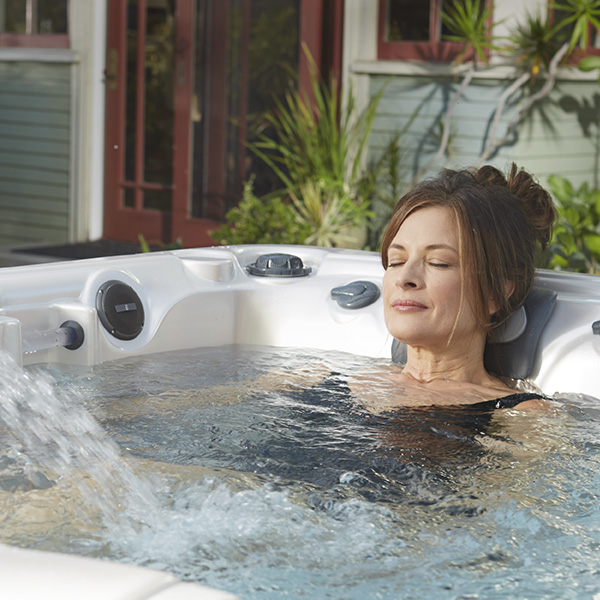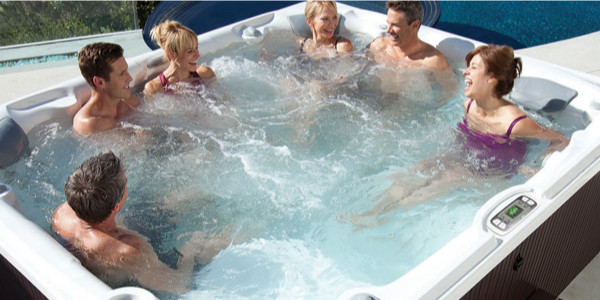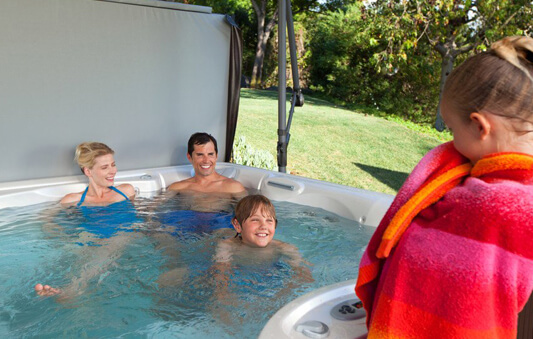How to keep your water clean
How to Keep Your Hot Tub Water Clean
A Comprehensive Guide to Quality Hot Tub Maintenance
Splash! Spray! Spritz! Ah, water. Humans are composed of approximately 60% water and we need it to stay alive. The average hot tub is filled with 200 – 700 gallons of water and it needs to be clean, clear and sparkling to provide life-giving benefits. Creating and maintaining healthy water balance and chemistry is attainable once you know the essentials.
It is vital to know the best water care options for your hot tub. Educating yourself is the key to develop a cache of tools that alleviate any water related challenges. You will build confidence in your routine as you achieve and maintain proper water chemistry. Keeping your hot tub ready to serve you and your family is the goal. Sparkling, clean, clear water will propel you past the goal line. Let’s plunge into the knowledge.
WATER CARE OPTIONS
FreshWater Salt System
- Add content here
FROG® @ease In-Line System
- Pre-filled mineral and chlorine cartridges eliminate the guesswork and provide carefree sanitation.
- In-line cartridges are smart and convenient. They fit inside your filtration system and automatically maintain consistent levels of sanitization.
FROG @ease Floating System
- FROG @ease combines our sanitizing minerals with SmartChlor® Technology to kill bacteria two ways. The result is Fresh Mineral Water® that’s silky soft with far less odors and the easiest water to maintain because it’s self-regulating. It knows when more sanitizing power is needed and automatically delivers it. When you need to do something, it flips over.
Find a hot tub water care routine that works for you
It is easy to be drawn into the idea that your hot tub water needs to be perfect. Well, there’s a reason why all the measuring devices include a range of acceptability. There are many things that affect the quality of your hot tub water including but not limited to heat, sun, chemicals and how many people use the hot tub (aka bather load). Rest assured variations are guaranteed and adjustments are always within reach. Use your favorite method to determine the healthy ranges for your water, and then relax. Your confidence will build as you develop a routine that works for you.
Best Hot Spring Spas Hot Tub
Water Treatment Options
It is important to learn about products that help you create the optimal hot tub water treatment experience for you, your family and friends. The following are a few essential items that will make your life easier and your hot tub water clean, clear and sparkling;

pH Up and pH Down. The pH balance of a liquid refers to the acid / alkaline balance. The pH scale runs from 1 to 14, with 7.0 being neutral. Any measure below 7.0 is considered acidic, which can cause deterioration of the fittings and surfaces of your hot tub. Any measure above 7.0 is considered alkaline. The optimal pH for hot tub water is 7.4, which happens to be the same pH level as the human eye.
Defoamer. A defoamer eliminates foaming caused by soap, shampoo, cleaners and other residues. While it is recommended that you shower before going in a hot tub, it isn’t always practiced. It can also be used to manage foam caused by soft water.
Conditioners and stabilizers. Water harshness can be lessened by using water conditioners. For example, use Vanishing Act which removes calcium buildup for softer-feeling water that is silkier on your skin. It helps protect your spa from the damaging effects of hard water. Stabilizers help keep water chemicals balanced.
Chlorine-free alternatives. An option for virtually chlorine-free water care combines the CD Ozone System and Monarch Silver Cartridges. Enzyme based sanitizers are also a chlorine-free option.
Stain and Scale Defense. You want crystal clear water and you want your hot tub’s surface to look its best too. Stain and Scale Defense prevents calcium build up on spa surfaces and controls stain and scale formation.
Calcium Hardness Increaser. Extremely soft water can corrode the shiny and soft surfaces of your hot tub. Calcium Hardness Increaser raises calcium levels in spa water to protect against this type of soft water related damage.
Quick Troubleshooting for Common Hot Tub Water Problems
Spa Water Problem:
Cloudy Water
| • Too Much Calcium – Use a test strip to check for high calcium levels. Source water that exceeds 400 parts per million od calcium, will cause cloudy hot tub water. |
| • Excessive Minerals Too much iron & copper can also cause cloudy spa water. |
Foamy Water
| • Foamy bubbles It can be caused by impurities in the water, and water that is too soft (too little calcium). |
| • Note that water hardness/softness levels differ across different regions. |
| • Water that is too soft (under 25-50 ppm) can cause corrosion to the shiny and soft hot tub surfaces. |
Smelly Water
| • Spa water stinks Smells can be produced due to multiple factors. Chloramines are typically the culprit of “the chlorine smell” emanating from your hot tub. |
| • Follow the steps to fix the water before performing a drain and refill. Removing the smell could be as simple as adding shock. |
Spa Water Problem:
Cloudy Water
| • Lower the Calcium Empty spa water and refill using a filtering device that removes minerals and other compounds. |
| • Calcium-lowering products are also available to use. That may require an additional clarifying agent. |
Foamy Water
| • Fix Soft Water Add a calcium hardness increaser. Follow directions on the product. |
| • Address the issue promptly to avoid further problems. |
Smelly Water
| • Fix smelly water Super shock the water. If this fixes the water, you likely have excessive chloramine levels due to your water being out of balance. |
How to Maintain Your Hot Tub Filter System
Check the filter regularly for debris, dirt, oils and sludge. Think of the grates in your filter as the gills on a fish. They need to be clean to keep the fish alive. Remove and rinse the filter using a hose with a nozzle to get it clean. Soak the filter in a bucket with an appropriate filter cleaning solution prior to rinsing it if there are excessive impurities. Any rips or tears in the filter fibers is an indication that replacement is required. Replacing your filter is an easy fix that will bring back your hot tub’s ability to play its part in creating sparkling, clean, clear water.

Know When to Drain and Refill Your Hot Tub Water

Water Care Maintenance Guides
How Can We Help You?
STORE HOURS
MONDAY – FRIDAY: 9am – 6pm
SATURDAY: 9am – 5pm
SUNDAY: Closed
LOCATION
163 East 14th Street
Elmira Heights, NY 14903
Get Directions

